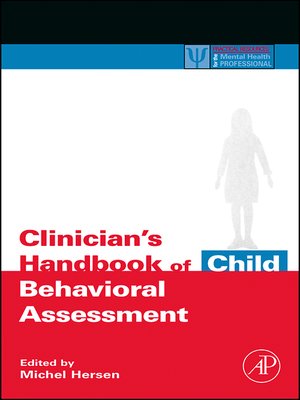Clinician's Handbook of Child Behavioral Assessment
ebook ∣ Practical Resources for the Mental Health Professional
By Michel Hersen

Sign up to save your library
With an OverDrive account, you can save your favorite libraries for at-a-glance information about availability. Find out more about OverDrive accounts.
Find this title in Libby, the library reading app by OverDrive.



Search for a digital library with this title
Title found at these libraries:
| Library Name | Distance |
|---|---|
| Loading... |
Given the vast amount of research related to behavioral assessment, it is difficult for clinicians to keep abreast of new developments. In recent years, there have been advances in assessment, case conceptualization, treatment planning, treatment strategies for specific disorders, and considerations of new ethical and legal issues. Keeping track of advances requires monitoring diverse resources limited to specific disorders, many of which give short shrift to child assessment, overlooking developmental considerations. Much of the existing literature is either theoretical/research in focus or clinical in nature. Nowhere are the various aspects of child behavioral assessment placed in a comprehensive research/clinical context, nor is there much integration as to conceptualization and treatment planning. The Clinician's Handbook of Child Behavioral Assessment was created to fill this gap, summarizing critical information for child behavioral assessment in a single source. The Clinician's Handbook of Child Behavioral Assessment provides a single source for understanding new developments in this field, cutting across strategies, techniques, and disorders. Assessment strategies are presented in context with the research behind those strategies, along with discussions of clinical utility, and how assessment and conceptualization fit in with treatment planning. The volume is organized in three sections, beginning with general issues, followed by evaluations of specific disorders and problems, and closing with special issues. To ensure cross chapter consistency in the coverage of disorders, these chapters are formatted to contain an introduction, assessment strategies, research basis, clinical utility, conceptualization and treatment planning, a case study, and summary. Special issue coverage includes child abuse assessment, classroom assessment, behavioral neuropsychology, academic skills problems, and ethical-legal issues. Suitable for beginning and established clinicians in practice, this handbook will provide a ready reference toward effective child behavioral assessment.







